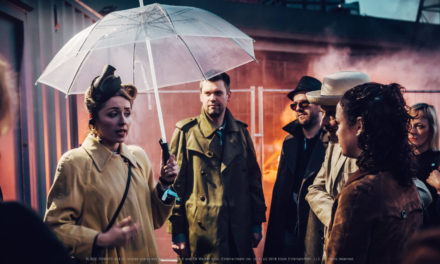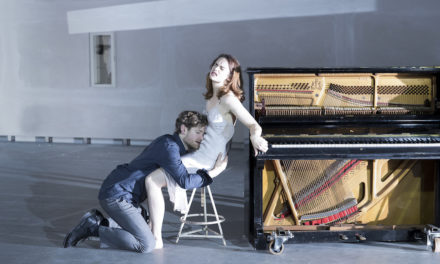A lonely corner at night in the London neighborhood of Hackney. A group of strangers meet, hesitantly asking each other “Are you here for a play?” It is not a code word. They are there (or in any other of the secret locations that vary each night) for a performance of Ibsen’s A Doll House as created by the Danish company Fix & Foxy. Soon this unlikely group is greeted by three English theatre artists who introduce the play. Ibsen was the champion of Realism, so this production of its most performed play centers on reality by taking the audience into “the real living room of a real couple.”
The audience takes over the intimate space waiting for theatre to happen. But what will happen will challenge the definition of what theatre is. The key aspect is the “performers.” They have never rehearsed the event, and might not even know who Ibsen is or the plot of the play. They probably do not have any improv experience, either, but that does not matter because they will not be left to improvise. The three artists who presented the play act as live-directors of the performance; they usher the couple through Ibsen’s story while asking them questions about their lives. Granted, many points of the couple’s life do not map onto A Doll’s House, and in those cases, the directors would indicate the differences in order to move to plot forward.
In this configuration, the driving force of the performance is no longer plot, character, rhythm, or even the dramatic action developing, but a voyeuristic feeling of peeking into someone’s life. The audience’s hunger for stories is fed juicy material about real beginnings, hopes, dreams, struggles, love, and family. Thus the balance between fiction and reality is thrown off and muddled: the “real space” of the couple’s home is taken over by an audience that, outside their control (even playing hide and seek in their bedroom), and while the fictional characters are strangers to the “performers,” their true identity, reinforced by all the questioning, is put “on display.” Ibsen’s story of how Nora breaks free from the expectations that plagued her life, from her father’s memory and her husband’s control, from her doll house, stops being relevant, replaced by the prominence of real events.
Curiously, juxtaposing actual events and feelings with Nora and Torvald’s fictional story, made the former render the latter pale and inconsequential. Who cares whether Torvald could forgive anything to Nora when we hear that this real man would forgive anything to his partner? Can you really believe and be emotionally impacted when he is told to say he no longer loves her? By holding reality and fiction simultaneously in mind, the audience can immediately discount any staged action as “acting” in a way that does not happen with an actor that is always “in character” and thus never breaks the suspension of disbelief.
Furthermore, if the fictional events could truly, albeit momentarily, be believed, the psychological impact on the real couple could truly be affected, and consequently, the morality of the performance could be put into question. In the realm of psychology, any potential effect a study can have on a participant has to be monitored and rectified to assure mental safety. But theatre is not regulated the same way psychological experiments are. If the woman “playing” Nora could believe and consequently feel to a degree the weight of Torvald’s words coming out of her partner’s lips when he says he no longer loves her, then we can trust the words’ emotional consequences words will also take place. Even if everything will be laughed off as theatre at the end of the evening, while the performance was taking place, the live-directors were using with two real people and their story, manipulating their real feelings to fit into a narrative. The couple became dolls, ordered what to do and what to feel in their own house.
Some of the directions the directors gave to elicit a particular emotional response from the couple seemed taken from a Strasberg class. “Can you remember any time you felt disappointed?” “Did it hurt?” Regardless of the debate of whether of affective memory is a healthy practice or not, there is a difference between a Method Actor knowingly “using himself” after a training and a normal person’s psychic history being used for a performance by others. Or is there? Assuming the couple knew and consented to the use of their memories and feelings to be used to the performance, is there any other difference? Is theatre morality intrinsically linked with the use of actors as performers? Or anyone can do what an actor does and leave unscathed?
For psychology experiments to obtain permission to be carried out potential findings have to justify the methods. Perhaps the magic of theatre can turn that performance night into a reflective event for both the audience and the couple involved. Perhaps acting training is not as important as we think, or actors will decrease in importance as the text has in the 20th century. Do those moments of truthfulness, snatched from a couple’s real life become more significant and impactful than anything that can be accessed through fiction? Or is it just the theatre version of reality TV?
This post was written by the author in their personal capacity.The opinions expressed in this article are the author’s own and do not reflect the view of The Theatre Times, their staff or collaborators.
This post was written by Aida Rocci Ruiz.
The views expressed here belong to the author and do not necessarily reflect our views and opinions.


















